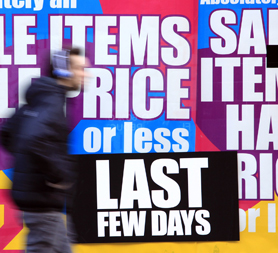Economy slump is worse than expected
 Siobhan Kennedy
Washington Correspondent
Siobhan Kennedy
Washington Correspondent
GDP dropped 0.6 per cent in the last quarter of 2010 – worse than the original 0.5 per cent estimate which caused economic shockwaves. Can the Government still blame the weather, Siobhan Kennedy asks.

Revised figures have shown that the UK economy shrank even more than first reported in the last quarter of 2010.
Initial figures indicated that the Gross Domestic Product (GDP) had slipped by 0.5 per cent but this has now been revealed as around 0.6 per cent.
The Chancellor, George Osborne, blamed the fall on the heavy snow that swept the country in the run up to Christmas Day. The 0.5 per cent crunch was calculated to be in direct corrolation with the effects of the adverse weather conditions by the Office for National Statistics (ONS).
However, the revised figure sparked surprise and worry amongst City economists who had expected the official figure to stay at 0.5 percent or even improve. Industrial production was also revised from 0.9 percent to 0.7 percent whilst the construction sector slumped by 2.5 percent.
The GDP drop could mean that the expected rise in interest rates to help bring down rising inflation may not happen as soon as first expected. It is the largest negative growth that the economy has suffered in two years.
It’s time to wake up and smell an economy in big trouble. TUC General Secretary Brendan Barber
Despite the ONS insisting that 0.5 percent of the drop in GDP was down to the worst December weather on record, the signs have not looked any better so far in 2011.
Last week, John Lewis reported that the fifth week of the year’s trading was down against last year’s figures, whilst across the retail sector February sales grew at their slowest rate since June 2010. A second quarter of decline in economic growth will mean that the UK is back in recession and a victim of the dreaded ‘double-dip’.
The TUC General Secretary, Brendan Barber, said: “The Government’s hope of an upwards revision of growth has been dashed. It’s time to wake up and smell an economy in big trouble. We need a plan B that doesn’t send it over the edge with deep rapid spending cuts.”
FactCheck found that the cold spell was only part of the economic problem
High oil prices and the VAT increase contributed to the rate of inflation rising from 3.7 percent to 4 percent in January, well above the Bank of England’s target of 2 percent – growing incremementally 0.1 per cent month-on-month for more than a year and expected to hit 5 per cent in a few months.
The poltical unrest across the major oil providers of North Africa and the Middle East is expected to result in a continuing rise in the price of oil.
The only large area of positive growth in the economy was in Government spending – at 0.7 percent – one area guaranteed to fall further as the Government tightens its belt to deal with the huge budget deficit. The Treasury confirmed that despite the latest revisions it will not alter its plans to focus on cutting the nation’s borrowing.
A Treasury spokesman said: “The Chancellor said that the fourth quarter growth figures were disappointing and today’s revision doesn’t change that fact. It also doesn’t change the need to deal with the nation’s credit card – the country is borrowing more this year than is spent on the entire NHS.”
Many analysts and experts believe that it is not all doom and gloom. Neil Hunter of Travelex Global Business Payments told Channel 4 News: “It’s disappointing but not disastrous. I think people need to remain positive. The drop in construction was obviously effected by the snow. Retail sales rebounded a bit in January, manufacturer production grew from the accounts we’re getting. There is still some good trading going on out there.”
The Travelex Confidence Index, that measures confidence within the cogs of the UK economy, found that despite the worrying figures there is still positivity amongst exporters. This may have something to do with growing European economies like in Germany, where they are increasingly reliant on component exports from the UK for their improving manufacturing sector.




